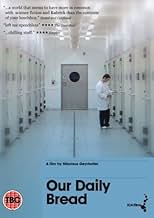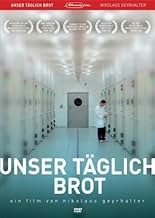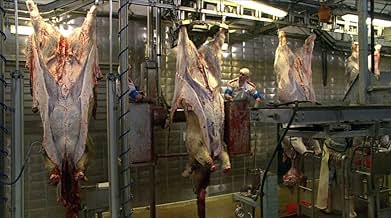VALUTAZIONE IMDb
7,5/10
2738
LA TUA VALUTAZIONE
Aggiungi una trama nella tua linguaOUR DAILY BREAD is a wide-screen tableau of a feast which isn't always easy to digest - and in which we all take part. A pure, meticulous and high-end film experience that enables the audien... Leggi tuttoOUR DAILY BREAD is a wide-screen tableau of a feast which isn't always easy to digest - and in which we all take part. A pure, meticulous and high-end film experience that enables the audience to form their own ideas.OUR DAILY BREAD is a wide-screen tableau of a feast which isn't always easy to digest - and in which we all take part. A pure, meticulous and high-end film experience that enables the audience to form their own ideas.
- Regia
- Sceneggiatura
- Star
- Premi
- 4 vittorie e 5 candidature totali
Recensioni in evidenza
The quality of the this film, how it focuses on the various aspects of large and highly advanced agricultural processes used in Europe is very interesting and seems to include a great amount of detail in the various processes that result in the meat and vegetables that are destined to show up on people's dinner tables. From feeding beef cattle to harvesting Irish potatoes we get fine quality shots that include so much information both close-up and deep shots. Most of us are so distanced from how our food is produced. Most producers I would imagine don't really want to let us in on what goes on before the products shows up in our market showcase. The candidness of the images that show the operations where the food is grown and processed is great. I bet that few food producers in the U.S would allow such filming in the establishments
The recent film "Fast Food Nation" imposes a fictional narrative onto the factual expose of Eric Schlosser's informative and horrifying book about (among other things) the industrialization of agriculture. The documentary "Our Daily Bread" makes no such concession to its audience's need for story, presenting virtually wordlessly scene after scene of modern food production in action.
It's a cliché at this point to note how modern consumers are alienated from their diets, making no connection between the plastic-wrapped pieces of muscle they purchase in the supermarket and the animals they were once part of. Still, Austrian director Nikolaus Geyrhalter presents dozens of memorable and fascinating images, not all of them of the gross-out variety. In fact, there's even an abstract beauty to some of what we see, at least until we realize it's all part of a vast killing machine.
Difficult to sit through, "Our Daily Bread" is nonetheless an important record, invaluable for those with the courage to watch it.
It's a cliché at this point to note how modern consumers are alienated from their diets, making no connection between the plastic-wrapped pieces of muscle they purchase in the supermarket and the animals they were once part of. Still, Austrian director Nikolaus Geyrhalter presents dozens of memorable and fascinating images, not all of them of the gross-out variety. In fact, there's even an abstract beauty to some of what we see, at least until we realize it's all part of a vast killing machine.
Difficult to sit through, "Our Daily Bread" is nonetheless an important record, invaluable for those with the courage to watch it.
Don't watch this movie if you have bad stomach or you won't be able to eat for a while. It shows quite a bit of shocking footage of modern food processing facilities. Dehumanization of food processing is well shown by creative camera placement. Camera placement resembles Kubrick's in some scenes - scenes of machines and people moving through corridors. Some of machines and procedures shown in the movie are really shocking. Movie doesn't have any narration, only sounds that you hear are sounds of the environment. A bit of well picked music would make this movie even better. If you want to know how the food you eat comes to your table this is the movie to watch.
if by artistic you mean concerned only with aesthetics, and beautiful camera work, and gorgeous film, and incredible color. i gotta take issue with saying that the documentary was cold and dispassionate and too concerned with art for art's sake. i would have to say not by the longest long shot. because....because the movie was equally as much about the people producing the food as it was about the production. and thats where much of the heart of the whole movie lies---you just don't notice it right away because there is no sound track, or you don't hear or understand the conversation between people. the isolation of the producers one from each other, for instance. the silence that they work in. those big ear muffs they wear. the deafening noise. the isolating self0-conscousness of being on camera, the movie maker implicating himself. (i definitely saw that a couple of times.) look at that first shot of the woman eating by herself with the mangled finger. an UNBELIEVABLY compassionate image. describing close to the entire world in thirty seconds. Or the next woman, taking her smoking break.
the voicelessness is about isolation. the workers, the animals, the act of filming. the "dumbness" of animals--their inability to speak--and that of the workers on many occasions--is what maybe the movie is all about. (and so the wordless narration is maybe an act of empathy with the animals?? I dunno for sure, but i could make a good argument i was going to write a paper.
and what about the shoeless guy in "The Dominator"?
AND... did notice how, when the ethnic workers are introduced, as opposed to the white northern working classes of Europe, when the immigrant populations are shown at work, the movie slightly changes?? The first and only shot of people at home, and talking in a group, and cooking at home (rice), are Africans. Refugees of wars, no doubt. For a long time in this film,m, I was wondering where the ethnic minorities who make up so much of Europes' working class had disappeared to. Suddenly, mid way, they show up. i don't think it's completely by accident. not completely. Then, later, the Arabic guys are shown taking there lunch break. they too, are eating and talking with each other. taking there break under a tree, close to the ground that they are harvesting from. these shots if anything rubbed me a little bit the wrong way, thinking a little bit of idealizing of the non-European "other" was going on. but the movie redeems itself on this front--or just proves me wrong--when we see a big table of white Europeans eating together. something is most definitely being said about tribalism, and about race, and consumption habits.
i could talk reams about how great this movie is--write a dissertation even like maybe Chris here--but that would totally ruin it. see the movie, its phenomenal. and disturbing..
the voicelessness is about isolation. the workers, the animals, the act of filming. the "dumbness" of animals--their inability to speak--and that of the workers on many occasions--is what maybe the movie is all about. (and so the wordless narration is maybe an act of empathy with the animals?? I dunno for sure, but i could make a good argument i was going to write a paper.
and what about the shoeless guy in "The Dominator"?
AND... did notice how, when the ethnic workers are introduced, as opposed to the white northern working classes of Europe, when the immigrant populations are shown at work, the movie slightly changes?? The first and only shot of people at home, and talking in a group, and cooking at home (rice), are Africans. Refugees of wars, no doubt. For a long time in this film,m, I was wondering where the ethnic minorities who make up so much of Europes' working class had disappeared to. Suddenly, mid way, they show up. i don't think it's completely by accident. not completely. Then, later, the Arabic guys are shown taking there lunch break. they too, are eating and talking with each other. taking there break under a tree, close to the ground that they are harvesting from. these shots if anything rubbed me a little bit the wrong way, thinking a little bit of idealizing of the non-European "other" was going on. but the movie redeems itself on this front--or just proves me wrong--when we see a big table of white Europeans eating together. something is most definitely being said about tribalism, and about race, and consumption habits.
i could talk reams about how great this movie is--write a dissertation even like maybe Chris here--but that would totally ruin it. see the movie, its phenomenal. and disturbing..
I'm always a sucker for films that try to emulate Baraka or Koyaanisqatsi. Non narrative films that let the images speak for themselves. A lot of films try and fail. Sometimes the images are too boring, sometimes it's too repetitive. 'Our Daily Bread' just about nearly gets it right by exploring how the food on our table comes to be. By going all over the world, and exploring all sorts of food, the filmmakers cover a spectacular realm of food, animals, and people for the documentary. Much is spectacular. What I found, and maybe I'm just a sicko, who knows, but I found the segments regarding how animals are processed to be the most fascinating. They almost completely copied the chick harvesting from Baraka (and who could blame them!) to the, I'm sorry, totally cool way they kill pigs nowadays. FUN FOR EVERYONE! Ha ha! I loved it!
Lo sapevi?
- ConnessioniReferenced in Film Junk Podcast: Episode 232: Inglourious Basterds (2009)
I più visti
Accedi per valutare e creare un elenco di titoli salvati per ottenere consigli personalizzati
Dettagli
Botteghino
- Lordo in tutto il mondo
- 71.810 USD
- Tempo di esecuzione
- 1h 32min(92 min)
- Colore
- Mix di suoni
- Proporzioni
- 1.85 : 1
Contribuisci a questa pagina
Suggerisci una modifica o aggiungi i contenuti mancanti




















